
Shooting sports is a group of competitive and recreational sporting activities involving proficiency tests of accuracy, precision and speed in shooting — the art of using ranged weapons, mainly small arms and bows/crossbows.

Hunting is the human practice of seeking, pursuing, capturing, and killing wildlife or feral animals. The most common reasons for humans to hunt are to obtain the animal's body for meat and useful animal products, for recreation/taxidermy, although it may also be done for resourceful reasons such as removing predators dangerous to humans or domestic animals, to eliminate pests and nuisance animals that damage crops/livestock/poultry or spread diseases, for trade/tourism, or for ecological conservation against overpopulation and invasive species.
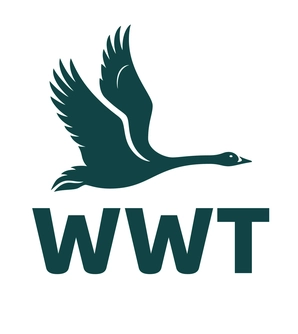
The Wildfowl & Wetlands Trust (WWT) is an international wildfowl and wetland conservation charity in the United Kingdom.

In the United Kingdom, gun ownership is considered a privilege, not a right, and access by the general public to firearms is subject to strict control measures. Members of the public may own certain firearms for the purposes of sport shooting, recreation, hunting or occupational purposes, however, they must be properly licensed.

Gun dogs or bird dogs are types of hunting dogs developed to assist hunters in finding and retrieving game, typically various fowls that are shot down on the wing. The term hunting dog is broad and includes all breeds and skills of hunting canines, but "gun dogs" refers to canines that are trained to work alongside a loud firearm while hunting or retrieving game. Gun dogs are divided into three main categories: pointers and retrievers, setters and spaniels, and water dogs.

In the United Kingdom, a gamekeeper is a person who manages an area of countryside to make sure that there is enough game for hunting, or fish for fishing, and acts as guide to those pursuing them.
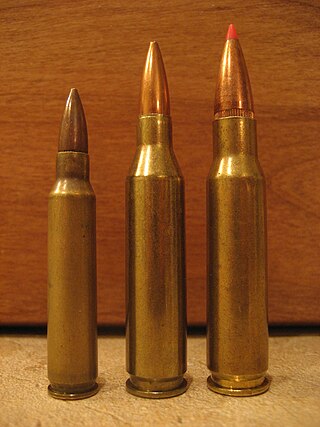
The .243 Winchester (6×52mm) is a popular sporting rifle cartridge. Developed as a versatile short action cartridge to hunt both medium game and small game alike, it "took whitetail hunting by storm" when introduced in 1955, and remains one of the most popular whitetail deer cartridges. It is also commonly used for harvesting blacktail deer, pronghorns and mule deer with heavier rounds, and is equally suited to varmint hunting with lighter rounds. The .243 is based on a necked down .308 Winchester, introduced only three years earlier. Expanding monolithic copper bullets of approximately 80 to 85 grains or traditional lead rounds of 90 to 105 grains with controlled expansion designs are best suited for hunting medium game, while lighter rounds are intended for varmints.

Bowhunting is the practice of hunting game animals by archery. Many indigenous peoples have employed the technique as their primary hunting method for thousands of years, and it has survived into contemporary use for sport and hunting.

A combination gun is a firearm that usually comprises at least one rifled barrel and one smoothbore barrel, that is typically used with shot or some type of shotgun slug. Most have been break-action guns, although there have been other designs as well. Combination guns using one rifled and one smoothbore barrel are commonly found in an over-and-under configuration, while the side-by-side configuration is usually referred to as a cape gun. A combination gun with more than two barrels is called a drilling with three barrels, a vierling with four barrels, and a fünfling with five barrels. Combination guns generally use rimmed cartridges, as rimless cartridges are usually more difficult to extract from a break-action firearm.

Shooting Times & Country Magazine, more commonly known as the Shooting Times, is a British shooting, fieldsports, and conservation magazine, published by Fieldsports Press Ltd. The magazine also features articles on fishing, deer stalking, gamekeeping, gundogs, cookery, and conservation.

Deer hunting is hunting deer for meat and sport, and, formerly, for producing buckskin hides, an activity which dates back tens of thousands of years. Venison, the name for deer meat, is a nutritious and natural food source of animal protein that can be obtained through deer hunting. There are many different types of deer around the world that are hunted for their meat. For sport, often hunters try to kill deer with the largest and most antlers to score them using inches. There are two different categories of antlers. They are typical and nontypical. They measure tine length, beam length, and beam mass by each tine. They will add all these measurements up to get a score. This score is the score without deductions. Deductions occur when the opposite tine is not the same length as it is opposite. That score is the deducted score.

In the United Kingdom, the term hunting generally refers to hunting with hounds, e.g. normally fox hunting, stag (deer) hunting, beagling, or minkhunting, whereas shooting is the shooting of game birds. What is called deer hunting elsewhere is deer stalking. According to the British Association for Shooting and Conservation (BASC) over a million people a year participate in shooting, including stalking, shooting, hunting, clay shooting and target shooting. Firearm ownership is regulated by licensing.
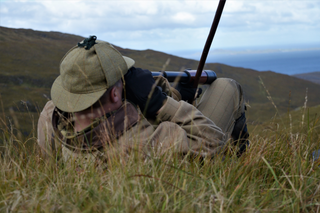
Deer stalking, or simply stalking, is a British term for the stealthy pursuit of deer on foot to hunt for venison, leisure, trophy, or to control their numbers as part of wildlife management, just as with rabbiting and boar hunting. Deer hunted in the UK are red deer, roe deer, fallow deer, sika deer, muntjac, water deer, and hybrids of these deers.
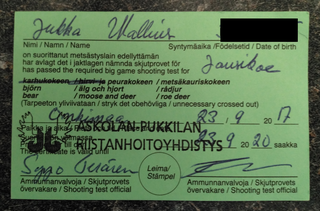
A hunting license or hunting permit is a regulatory or legal mechanism to control hunting, both commercial and recreational. A license specifically made for recreational hunting is sometimes called a game license.
Game preservation is maintaining a stock of game to be hunted legally. It includes:
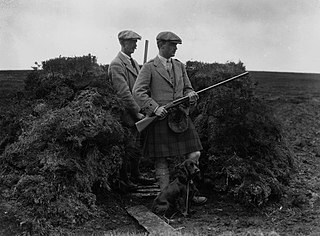
Driven grouse shooting is a field sport in the United Kingdom involving the shooting of red grouse. It is one of two forms of the sport; the other is walked-up shooting. Driven grouse shooting involves grouse being driven to fly over people with shotguns in fixed positions. In walked-up shooting the participants walk forward in a line and flush the birds as they go. Walked-up shooting is more physically demanding than a driven shoot and typically involves fewer birds being shot.
Irish Countrysports and Country Life Magazine is an Irish hunting, shooting, fishing and country lifestyle magazine. From 1985 until 2002 it was known as The Irish Hunting, Shooting and Fishing Magazine. The magazine is produced quarterly and features seasonal articles on hunting, fishing, shooting, deer stalking, gamekeeping, gundogs, art, antiques, property, interior design and conservation.

A professional hunter is a person who hunts and/or manages game by profession. Some professional hunters work in the private sector or for government agencies and manage species that are considered overabundant, others are self-employed and make a living by selling hides and meat, while still others guide clients on big-game hunts.
Gun culture refers to the attitudes, feelings, values and behaviour of a society, or any social group, in which guns are used. The term was first coined by Richard Hofstadter in an American Heritage article critiquing gun violence in the United States.

The ball and shot gun, often also known by the marketing name paradox gun, is a shotgun capable of firing both shot and solid projectiles. First built by Holland and Holland, the term paradox is a proprietary name applied to these guns by Holland and Holland.


















